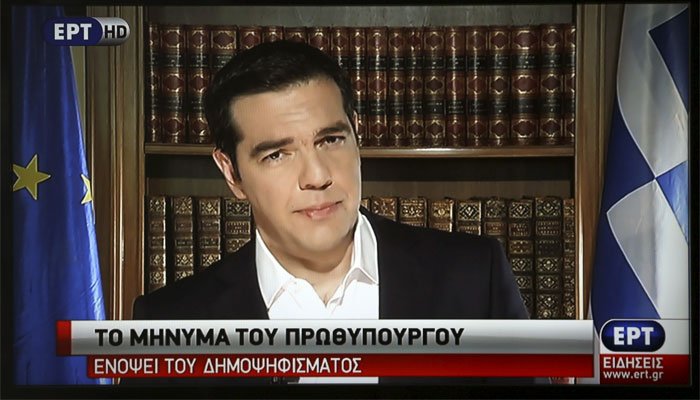Greek Prime Minister Alexis Tsipras is seen on a television monitor while addressing the nation in Athens, Greece July 3, 2015. Reuters
AFP/Athens
Greek Prime Minister Alexis Tsipras on Friday urged voters to ignore European scaremongering and vote 'No' in this weekend's referendum as polls showed support swinging behind the 'Yes' campaign.
Huge rival rallies are expected in central Athens late Friday to galvanise support for each side in Sunday's plebiscite.
Many Greeks, who are struggling under capital controls that have limited daily ATM withdrawals to just 60 euros ($67), fear EU leaders' warnings that a 'No' vote could mean Greece's exit from the euro -- a Grexit.
The sense of building crisis was heightened further by a Eurozone emergency fund officially declaring Greece to be in default.
The European Financial Stability Facility (EFSF), which provided funds to Eurozone countries in difficulty, said however it won't demand immediate repayment of its Greek loans worth 145 billion euros ($160 billion).
Tsipras insisted that his decision to stop debt negotiations last week and call the referendum "does not mean a break with Europe".
He called on creditors to restructure Greek's unsustainable 323-billion-euro debt mountain by forgiving 30 percent of the debt owed to them and allowing a 20-year grace period for repaying the rest.
Only a last-minute challenge to the legality of the ballot in Greece's top administrative court, the Council of State, might be able derail it. The court was to give its ruling Friday.
Confusion, however, is widespread over the very technical question posed in the referendum, compounding concerns over what the post-vote consequences might be.
The two latest polls published Friday showed voter intentions were effectively tied.
An Alco institute poll found 44.8 percent of Greeks intend to vote 'Yes' and 43.4 percent are for 'No'. A Bloomberg survey for Greece's Macedonia University was equally split, showing 43 percent to vote 'No' and 42.5 percent 'Yes'.
European Commission chief Jean-Claude Juncker warned that Greece's negotiating position, far from being strengthened, would be "dramatically weakened" in the event of a 'No'.
Even if the 'Yes' vote wins, there would still be "difficult" negotiations ahead, he added.
Confusing question
Greek voters are confronted with a referendum question that has stumped many.
The question reads: "Should the deal draft that was put forward by the European Commission, the European Central Bank and the International Monetary Fund in the Eurogroup of June 25, 2015, and consists of two parts, that together form a unified proposal, be accepted? The first document is titled 'Reforms for the Completion of the Current Programme and Beyond' and the second 'Preliminary Debt Sustainability Analysis'."
Eurozone officials have firmly said that the "deal" referred to expired on Tuesday -- the same day Greece failed to make a 1.5-billion-euro payment to the IMF, becoming the first developed country ever to do so.
On July 20, Greece looks likely to be unable to repay another 3.5 billion euros owed to the ECB.
Some voters who initially backed the government have swapped sides ahead of Sunday's ballot.
"I was going to vote 'No' because I think the Greek people are being treated with contempt. But Tsipras has made the situation so much worse, it's his fault the banks are closed," said an Athens shop assistant Suzanna Alizoti.
Despair
Greek pensioners without bank cards have been limited to one 120-euro over-the-counter withdrawal, prompting despair among many.
In Greece's second-biggest city of Thessaloniki, one retired man unable to withdraw his 120 euros crumpled to the ground, scattering his papers. A bank manager quickly resolved the problem.
In Athens, another pensioner, Kostas, was regularly withdrawing his and wife's daily euro limits from ATMs for fear they might be seized by the government or converted to drachmas. "My money is safer at home," he said.
Many cash machines were running short of denominations, allowing only the withdrawal of a 50-euro note.
Government future
Greek Finance Minister Yanis Varoufakis has said he would step down if a 'Yes' vote carried the day, and the rest of the government "may very well" do the same.
But Tsipras has been ambiguous, saying only he would respect the referendum's result and take the necessary steps "set out in the constitution".
Europe's main stock markets slipped during Friday trading as all eyes were riveted on Greece's referendum and what that might mean to investors at the beginning of next week.
"The vote seems tight," said VTB Capital economist Neil MacKinnon.
"A 'No' vote increases the chances of a Grexit as the ECB would pull the plug on the Greek banks," he said.
"A 'Yes' vote results in the resignation of the Greek government though it is not clear that this would necessarily result in a more creditor-compliant Greek administration that would sign up to the creditors' proposals quickly."

